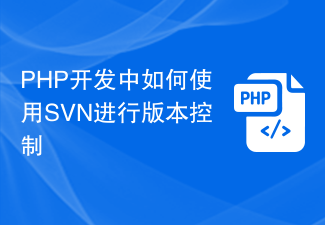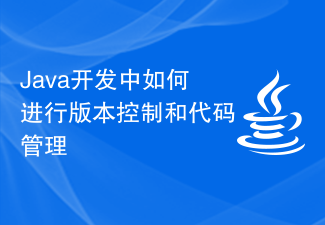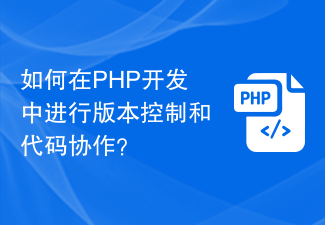 Backend Development
Backend Development PHP Tutorial
PHP Tutorial How to use version control system to package and deploy PHP programs?
How to use version control system to package and deploy PHP programs?How to use version control system to package and deploy PHP programs?
Introduction:
When developing PHP programs, we usually use version control systems (such as Git) to manage code versions and collaborate on development. However, simply using a version control system to manage code is not enough for program packaging and deployment. This article will introduce how to use a version control system, some packaging tools, and automated deployment tools to implement packaging and deployment of PHP programs.
1. Preparation
Before we start, we need to prepare the following tools and environment:
- A code hosting platform, such as GitHub, GitLab, etc.
- Install Git or other version control systems
- Composer-based PHP dependency management tool
- Packaging tools, such as Phar, Box, etc.
- Automated deployment tools, such as Jenkins, Travis CI, etc.
2. Use version control system to manage code
- Create a warehouse: Create a warehouse on the code hosting platform to manage all the code of the development project. Submit the code to the warehouse through Git. It is best to use branches for development to ensure that each function has an independent branch for development and testing.
- Collaborative development: When multiple people collaborate on development, everyone develops and debugs on their own branch, and regularly merges the code into the main branch to maintain code synchronization and stability.
3. Use Composer to manage dependencies
-
Create the composer.json file: Create the composer.json file in the project root directory and add the required dependency packages and version information.
{ "require": { "monolog/monolog": "1.25.0" } } - Install dependency packages: Run the
composer installcommand, and Composer will automatically download and install the required dependency packages. - Update dependent packages: Run the
composer updatecommand, Composer will check and update all dependent packages to the latest version.
4. Use packaging tools to generate executable files
- Install Phar: Run the
composer global require humbug/boxcommand to install the Phar tool globally. -
Create the box.json configuration file: Create the box.json file in the project root directory, and configure the files and directories that need to be packaged.
{ "directories": [ "src" ], "files": [ "index.php" ], "finder": [ { "exclude": ["vendor"] } ], "main": "index.php", "output": "myapp.phar" } - Package the project: Run the
box buildcommand, and Phar will package the project into an executable file (such as: myapp.phar) according to the configuration file.
5. Automated deployment
- Configure automated deployment tools: Configure packaging scripts in automated deployment tools (such as Jenkins, Travis CI). According to your needs, you can choose to automatically trigger the packaging script after each code submission, or trigger the packaging script regularly.
- Deploy to the target server: Configure the automated deployment tool to deploy the packaged and generated executable file to the specified location on the target server.
Conclusion:
By using the version control system to manage code, Composer to manage dependencies, the packaging tool to generate executable files, and the automated deployment tool to complete deployment, it is easier to package and package PHP programs. deploy. The benefits of using version control systems and related tools are that they can improve the efficiency of code management, ensure the quality and stability of the code, accelerate the development and deployment process, and also facilitate subsequent version updates and maintenance.
The above is the detailed content of How to use version control system to package and deploy PHP programs?. For more information, please follow other related articles on the PHP Chinese website!
 PHP开发中如何使用Git进行版本控制Jun 27, 2023 pm 02:48 PM
PHP开发中如何使用Git进行版本控制Jun 27, 2023 pm 02:48 PM随着互联网的快速发展,PHP已经成为了众多网站开发中的主流语言。众所周知,版本控制是软件开发中不可或缺的一个重要环节,而Git作为目前最流行的版本控制工具之一,其强大的功能和易用性受到了广大开发者的欢迎。本文将介绍如何在PHP开发中使用Git进行版本控制。一、Git基础知识在使用Git进行版本控制之前,我们需要对Git的基础知识有所了解。Git的三个工作区在
 PHP开发中如何使用SVN进行版本控制Jun 27, 2023 pm 01:39 PM
PHP开发中如何使用SVN进行版本控制Jun 27, 2023 pm 01:39 PM在PHP开发中进行版本控制是很常见的操作,其中最常用的工具就是SVN(Subversion)。它可以方便地管理代码的历史版本以及协同开发过程中的代码更新。下面将介绍如何在PHP开发中使用SVN进行版本控制。一、安装SVN客户端和服务端首先需要安装SVN客户端和服务端。SVN客户端可以在SVN官网上下载对应的版本,安装即可,而服务端则需要自行搭建,具体方法可以
 MySql的多版本管理:如何快速管理MySQL的多个版本Jun 16, 2023 am 08:11 AM
MySql的多版本管理:如何快速管理MySQL的多个版本Jun 16, 2023 am 08:11 AMMySQL是一种广泛应用于各种不同领域的数据库管理系统。在开发过程中,开发人员可能需要使用不同的MySQL版本来测试和开发。然而,如何轻松地管理MySQL的多个版本是一个挑战,特别是在一个项目中涉及多个版本时。本文将介绍一些快速管理MySQL多个版本的最佳实践。使用虚拟机使用虚拟机是管理多个MySQL版本的最常用和最简单的方法之一。虚拟机允许我们在单个计算机
 Java开发中如何进行版本控制和代码管理Oct 09, 2023 am 08:46 AM
Java开发中如何进行版本控制和代码管理Oct 09, 2023 am 08:46 AMJava开发中如何进行版本控制和代码管理,需要具体代码示例摘要:随着项目规模的扩大和团队协作的需要,版本控制和代码管理成为了Java开发中至关重要的方面。本文将介绍版本控制的概念、常用的版本控制工具,以及如何进行代码管理。同时,还将提供具体的代码示例以帮助读者更好地理解和实践。一、版本控制的概念版本控制是一种记录文件内容变化的方式,以便将来查阅特定版本的文件
 如何进行C++代码的版本控制?Nov 02, 2023 pm 04:35 PM
如何进行C++代码的版本控制?Nov 02, 2023 pm 04:35 PM如何进行C++代码的版本控制?引言:随着软件开发的不断发展,代码的版本管理变得至关重要。版本控制是一种管理和跟踪代码变化的机制,旨在提高代码开发和维护的效率。对于C++开发人员来说,版本控制是不可或缺的工具,本文将介绍如何进行C++代码的版本控制,以帮助开发人员更好地管理和跟踪代码变化。一、选择合适的版本控制系统在开始进行C++代码的版本控制之前,首先需要选
 如何在PHP开发中进行版本控制和代码协作?Nov 02, 2023 pm 01:35 PM
如何在PHP开发中进行版本控制和代码协作?Nov 02, 2023 pm 01:35 PM如何在PHP开发中进行版本控制和代码协作?随着互联网和软件行业的迅速发展,软件开发中的版本控制和代码协作变得越来越重要。无论是独立开发者还是团队开发,都需要一个有效的版本控制系统来管理代码的变化和协同工作。在PHP开发中,有几个常用的版本控制系统可以选择,如Git和SVN。本文将介绍如何在PHP开发中使用这些工具来进行版本控制和代码协作。第一步是选择适合自己
 Java开发中如何进行代码版本管理和发布Oct 10, 2023 pm 10:06 PM
Java开发中如何进行代码版本管理和发布Oct 10, 2023 pm 10:06 PMJava开发中如何进行代码版本管理和发布在Java开发中,代码版本管理和发布非常重要。它可以帮助团队协作开发,保持代码的安全性和稳定性,并使代码的迭代和发布更加高效。本文将介绍几种常用的代码版本管理工具,并提供具体的代码示例。GitGit是目前最流行的分布式版本控制系统,广泛应用于Java开发中。它可以记录每一次代码的修改,并提供强大的分支管理功能。Git使
 如何使用 PHP 实现自动更新和版本控制功能Sep 05, 2023 pm 02:28 PM
如何使用 PHP 实现自动更新和版本控制功能Sep 05, 2023 pm 02:28 PM如何使用PHP实现自动更新和版本控制功能概述:在开发网站和应用程序时,经常会遇到需要更新版本以修复漏洞或添加新功能的情况。手动更新和版本控制可能会比较繁琐和容易出错,因此我们可以利用PHP实现自动更新和版本控制功能。本文将介绍如何使用PHP和一些常用的工具来实现这些功能。步骤一:设置版本信息首先,在项目根目录中创建一个名为"version.jso


Hot AI Tools

Undresser.AI Undress
AI-powered app for creating realistic nude photos

AI Clothes Remover
Online AI tool for removing clothes from photos.

Undress AI Tool
Undress images for free

Clothoff.io
AI clothes remover

AI Hentai Generator
Generate AI Hentai for free.

Hot Article

Hot Tools

MinGW - Minimalist GNU for Windows
This project is in the process of being migrated to osdn.net/projects/mingw, you can continue to follow us there. MinGW: A native Windows port of the GNU Compiler Collection (GCC), freely distributable import libraries and header files for building native Windows applications; includes extensions to the MSVC runtime to support C99 functionality. All MinGW software can run on 64-bit Windows platforms.

mPDF
mPDF is a PHP library that can generate PDF files from UTF-8 encoded HTML. The original author, Ian Back, wrote mPDF to output PDF files "on the fly" from his website and handle different languages. It is slower than original scripts like HTML2FPDF and produces larger files when using Unicode fonts, but supports CSS styles etc. and has a lot of enhancements. Supports almost all languages, including RTL (Arabic and Hebrew) and CJK (Chinese, Japanese and Korean). Supports nested block-level elements (such as P, DIV),

WebStorm Mac version
Useful JavaScript development tools

Atom editor mac version download
The most popular open source editor

ZendStudio 13.5.1 Mac
Powerful PHP integrated development environment





